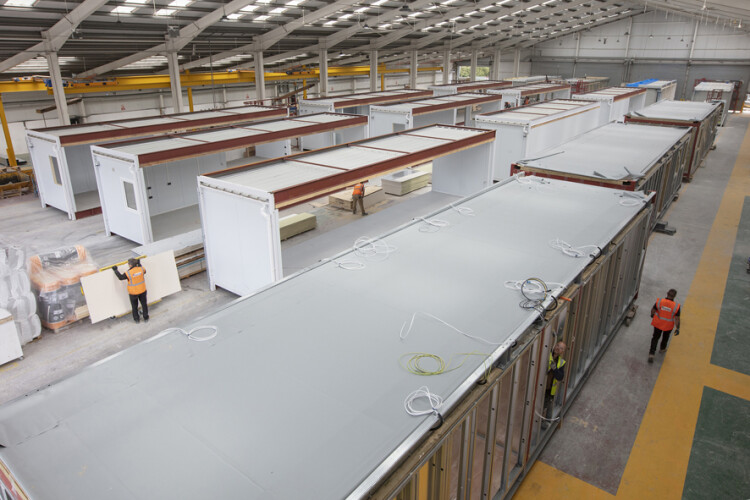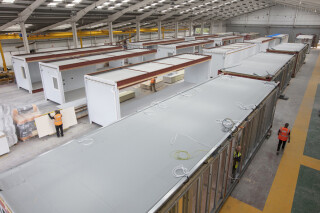They say it’s an ill wind that blows nobody any good, and there’s no doubt that there were many businesses – the makers of surgical masks and Perspex screens foremost among them – that suddenly found their products and services in huge demand as a result of the Covid-19 pandemic.
Although he would hate people to think he welcomed the pandemic, David Harris, managing director of prefabricated building specialist Premier Modular, cannot deny that Covid-19 stimulated a surge in demand for his products.
Back in June 2020 main contractor BAM Construction awarded Premier a contract to install five single-storey modular buildings comprising 57 steel-framed modules as part of its project to convert a former Homebase DIY store into a 1,700m2 Nightingale Hospital for the Royal Devon & Exeter NHS Foundation Trust.
This article was first published in the Dec/Jan 2021 issue of The Construction Index magazine. Sign up online.
The Premier units doubled the size of the existing space to provide additional facilities including a pharmacy, staff welfare, catering, utility rooms, patient transfer areas and stores. The whole thing was delivered in just four weeks.
Then in October, the Department for Health & Social Care put out the call for suppliers to provide temporary buildings for Covid-19 testing sites throughout the UK. The contracts were awarded through the Crown Commercial Service (CCS) framework of which Premier is an approved supplier.
“We responded immediately to say yes, we’d be able to help and mobilise very quickly,” says Harris. “There was then a very quick process of looking at a notional site, pricing it and explaining how we’d service the site and on the back of that we got the first 25 awarded to us.
“They were looking for regional suppliers so we put ourselves down for the North & Midlands as a regional base – because of course we’re based in East Yorkshire here – and very quickly we got given the first 25 sites,” explains Harris.
However, Premier’s regional base quickly proved to be irrelevant for the client. “Because of our scale and national presence they almost immediately gave us sites that were anywhere from Inverness right down to Portsmouth,” says Harris. In fact, although the first buildings supplied by Premier were installed in Bolton, these were quickly followed by sites in Glasgow, Nottingham and Havant.
Each self-contained test site comprises a 110m2 purpose-designed testing building, pre-fitted with eight patient cubicles, hygienic walls, separate staff entrances and exits, test collection and drop-off zones and a family testing zone.
In addition, there are welfare facilities in three buildings to accommodate a PPE room, stores, test preparation, staff rest room, kitchenette and toilet – plus essential services including water supply, wastewater collection and electricity generation.
Although other suppliers have also been appointed, Harris says that Premier was awarded the lion’s share of the contract – evidenced by the geographical spread of its sites – because of its demonstrable ability to deliver.
“We’ve got a large hire fleet of product here which is very interchangeable and flexible so we were able to respond really, really quickly to get these products out on site,” says Harris. “And we have full national coverage anyway so I think they realised we had the capability.”
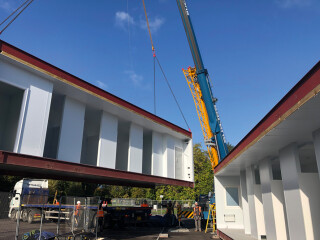
In fact, no sooner had Premier started to deliver its buildings to the customer’s site, than the initial order was doubled to 50 sites across the UK.
“Before we’d delivered the first nine or 10 sites we were basically doubled-up, so they gave us the same number again because we were out there delivering – which was obviously the priority to get these testing stations open,” adds Harris.
According to Harris, Premier Modular’s success with this contract is due to a combination of factors which he thinks is unique to the company. The three essential factors (none of which is unique in itself) are that Premier Modular not only manufactures its products but also maintains a large hire fleet; it specialises in buildings made up of modular components, rather than volumetric cabins; and everything is centralised at the company’s site in Brandesburton, near Beverley in East Yorkshire.

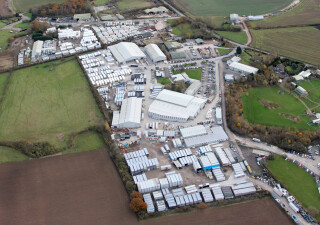
The single-site factor would appear, on the face of it, to be a disadvantage when you are required to supply products over a territory extending from northern Scotland to the south coast of England. But Harris says the reverse is true:
“We do have regional operational teams who know their local areas and clients, but by having all the fleet in one place, we can drive huge efficiencies in terms of refurbishment costs – and we don’t have to pay for storage,” he explains. “So although we’re paying a little more in transport, our costs are actually lower than if we had products located in separate sites around the country.”
Premier Modular has two discrete trading divisions, one manufacturing and selling permanent modular buildings, the other hiring temporary buildings such as those supplied for the Exeter Nightingale Hospital and the new Covid-19 test centres. The hire division’s core business, though, is site accommodation for the construction industry which Harris says makes up over 50% of the division’s revenues.
The product, however, is not your typical rectangular box-style site hut. “We are the only hire business that is completely modular-focused,” says Harris. “If you look at all our competitors, from Portakabin to Wernick to Elliotts, they have large fleets of standalone cabins within their hire makeup and they’re based nationally in depots. We’re not like that. If we had standalone cabins, then yes, it would make sense to have a network of depots because cabins are more of a commodity product,” he adds.
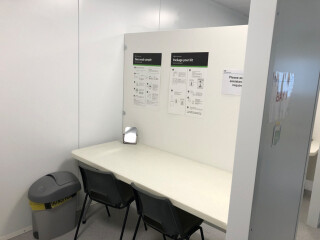
Harris explains that Premier Modular’s buildings combine standard off-the-shelf components with bespoke layouts and finishes. “Cabins are four-sided boxes and you can link them together if you want to. But ours are multiple units spliced together to create a bigger open space. They don’t need to be very large – these Covid units are only small, but they’re not single cabins; that’s the difference,” he says.
This modular design allowed Premier to produce a building design that met the specification for the Covid-19 test centres exactly, says Harris. “They [the client] were very specific about what would be needed as a minimum space requirement and in terms of how people could or couldn’t flow through the building, so the internal layout had to be very carefully thought through.”
Each 12m x 9m test centre is made up from three standard modules, but the interior layout is designed specifically for the customer’s requirements. “Externally, it’s very standardised, but internally, it’s quite easy for us to chop and change the layout and incorporate special finishes, such as the hygienic wipe-clean surfaces,” says Harris. “So it’s all about the internal fit-out, which we can do in our factories quite quickly,” he says.
The design was developed rapidly in close collaboration with the client. A basic plan was ready a few days before the order was placed; there then followed a number of iterations and design tweaks before the contract was awarded. Harris says the whole process, from initial enquiry to delivery, took less than two weeks.
“It was an incredibly intense time,” recalls Harris. “I can only take my hat off to our commercial, design and operations staff for taking the client requirements and turning them into reality in a little over a week.”
Satisfying the delivery schedules demanded by the client meant ramping up production significantly. “This was all about taking product, converting it to bespoke use and getting it out on site as quickly as possible. So we’ve taken about 60 people on and increased our night shift – partly for this, partly for other work – but it’s all about speed of turnaround so we can ensure we can respond to need,” explains Harris.
Premier Modular has a large manufacturing site with five separate production lines, each fully flexible and able to cater for the full product range. “That means we can really speed up or slow down to suit the market and we’re well used to doing that,” says Harris.
The last of the 50 Covid-19 test centres supplied by Premier Modular are scheduled for delivery in early January. The initial hire period is 26 weeks and Harris doesn’t expect they’ll be needed any longer than that.
“At the end, we’ll bring the units back to site here, clean them down, strip out any customer-specifics and then refurbish and repurpose them into other units. They’ll go straight back into the hire fleet and probably end up on construction sites,” says Harris.
This article was first published in the Dec/Jan 2021 issue of The Construction Index magazine. Sign up online.
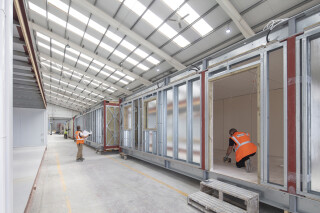
Got a story? Email news@theconstructionindex.co.uk

